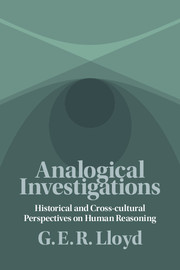Book contents
- Frontmatter
- Contents
- List of diagrams
- Introduction
- 1 On the very possibility of mutual intelligibility
- 2 The multiple valences of comparatism
- 3 Analogies, images and models in ethics: some first-order and second-order observations on their use and evaluation in ancient Greece and China
- 4 Analogies as heuristic
- 5 Ontologies revisited
- 6 Conclusions
- Glossary of Chinese terms
- Notes on editions
- Bibliography
- Index
2 - The multiple valences of comparatism
Published online by Cambridge University Press: 05 September 2015
- Frontmatter
- Contents
- List of diagrams
- Introduction
- 1 On the very possibility of mutual intelligibility
- 2 The multiple valences of comparatism
- 3 Analogies, images and models in ethics: some first-order and second-order observations on their use and evaluation in ancient Greece and China
- 4 Analogies as heuristic
- 5 Ontologies revisited
- 6 Conclusions
- Glossary of Chinese terms
- Notes on editions
- Bibliography
- Index
Summary
By ‘comparatism’ I understand not the first-order activity of making comparisons, but rather the second-order one of analysing how comparisons are used. This, to be sure, will largely be a matter of comparing how comparisons have been used, especially those that juxtapose some ‘other’ with some ‘us’, though we shall see that the motivations for so doing can differ widely. Then a second problem that comparatism raises relates to the validity or the justification for any such activity of comparing. What indeed are the criteria for viable comparisons? Should comparing be limited to those cases where we can specify a clear tertium comparationis? And how is that to be defined and who gets to settle that? Again, against those who assume that it is a normal, indeed an inevitable, resource for human understanding, there have been those who seek to impose strict controls on its use or even to replace it by what is represented as a more secure brand of argumentation. That last is a topic I shall take up in Chapters 3 and 4.
However, for now my chief aims are two-fold, first to uncover the hidden and sometimes not so hidden agenda that comparatism often serves, notably to suggest the superiority of one group's views – religious, cosmological, ethical – by way of a demonstration, or at least an assertion, of the inferiority of alternatives. That will take me, secondly, to an examination of whether the typical prejudices of comparatism can be overcome and, if so, how. Any analysis, such as those I am undertaking in these studies, must be based on a particular natural language into which others’ ideas are parsed, with the evident danger that that will more or less distort them by imposing inappropriate categories, such as no doubt, to some extent, the very ones I have just used, ‘religious’, ‘cosmological’, ‘ethical’. But while there can be no entirely neutral viewpoint from which to assess contending opinions, that does not mean we have no option but to stay with our existing conceptual framework. I hope to clarify the room for manoeuvre available to us, and indeed I shall bring comparatism to bear to help resolve some of the problems. The paradoxical point I shall argue for is that the very otherness of the Other, when we can get a hold of it, is a precious resource for us to broaden our intellectual and imaginative horizons.
There can have been very few human societies that have been totally isolated from all others and that know nothing of any other society. One problem here, so far as living societies go (dead ones are another matter, to be sure), is how anyone else can know about any such society, for as soon as contact is made with its members, that removes their total isolation. However, most human societies who know about others assume that they themselves provide the models of a proper human community, maybe the only authentic one, and that other groups all fall short. Ethnography provides countless examples where members of a particular society refer to themselves simply as ‘the people’ and do not accept the names that are given to them by others.
- Type
- Chapter
- Information
- Analogical InvestigationsHistorical and Cross-Cultural Perspectives on Human Reasoning, pp. 29 - 42Publisher: Cambridge University PressPrint publication year: 2015



